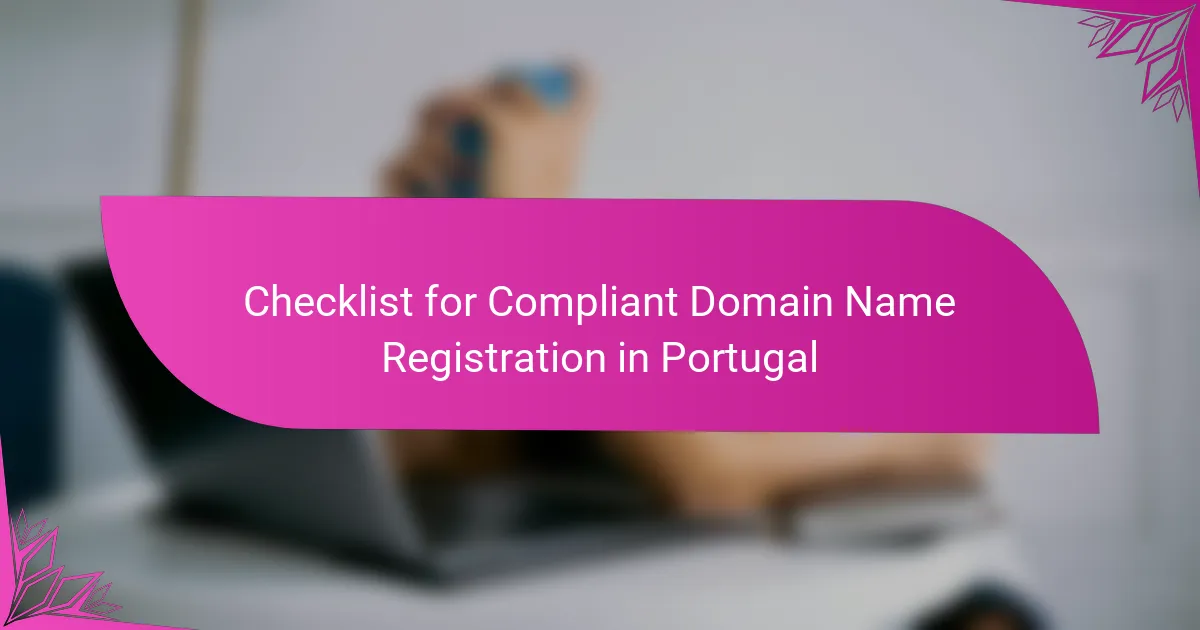Registering a domain name in Portugal requires adherence to specific local regulations and procedures. Key steps include selecting a valid domain name, working with an accredited registrar, and providing necessary documentation, such as a Tax Identification Number (NIF). By following these guidelines, individuals and businesses can ensure a smooth and compliant registration process for .pt domains.
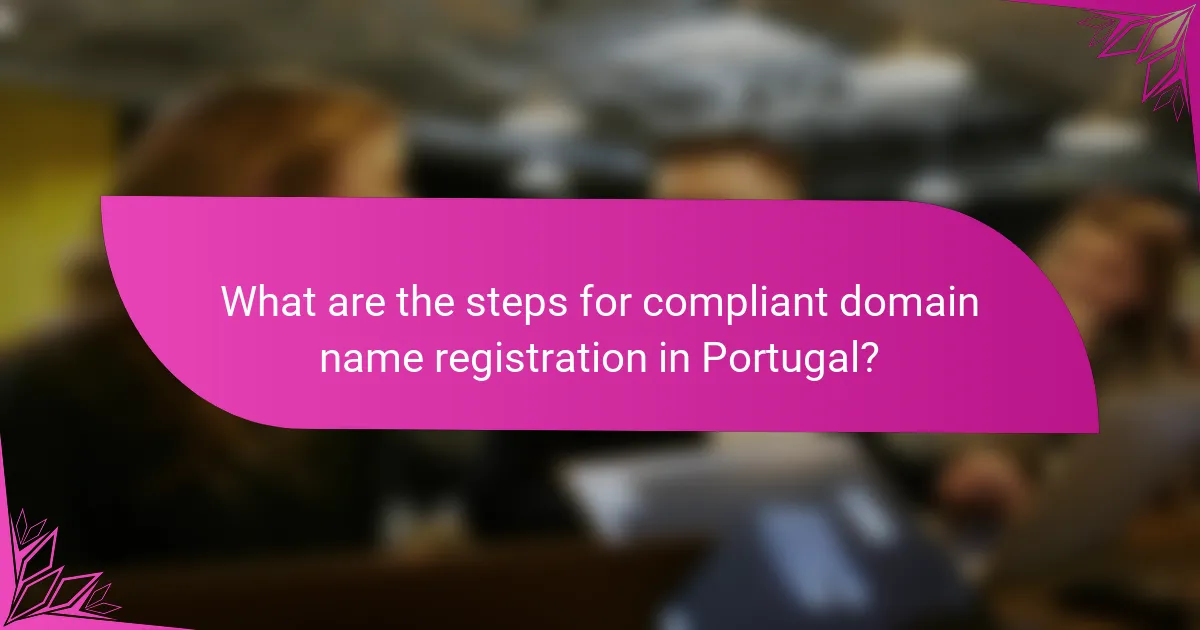
What are the steps for compliant domain name registration in Portugal?
To register a domain name in Portugal, follow a series of essential steps to ensure compliance with local regulations. This process includes selecting a valid domain name, registering with an accredited registrar, and providing necessary documentation.
Choose a valid domain name
Selecting a valid domain name is crucial for compliance. Ensure that the name adheres to the rules set by the Portuguese domain authority, including avoiding trademarks and offensive terms. The domain must also be unique and not already registered by another entity.
Consider using a .pt extension for local relevance, as it signifies a connection to Portugal. Other extensions like .com or .eu are also available, but may not convey the same local identity.
Register with a certified registrar
To register your domain, choose a registrar accredited by the Portuguese DNS authority, DNS.PT. A certified registrar ensures that your registration complies with local laws and provides necessary support throughout the process.
Check the registrar’s reputation and customer reviews before proceeding. Look for registrars that offer competitive pricing and additional services like web hosting or email accounts.
Provide required documentation
When registering a domain in Portugal, you must submit specific documentation. This typically includes proof of identity, such as a national ID or passport, and, if applicable, business registration documents.
Ensure that all documents are current and clearly legible. Some registrars may also require additional information, such as a tax identification number, especially for business registrations.
Pay registration fees
Domain registration in Portugal involves paying a fee, which varies depending on the registrar and the domain extension. Generally, fees range from €10 to €30 per year for a .pt domain.
Be aware of renewal fees, which may differ from initial registration costs. Set reminders for renewal dates to avoid losing your domain.
Verify domain ownership
After registration, it’s essential to verify your domain ownership. This process typically involves confirming your email address through a verification link sent by the registrar.
Failure to verify ownership can lead to domain suspension. Regularly check your registration details and keep your contact information updated to ensure you receive important notifications from your registrar.
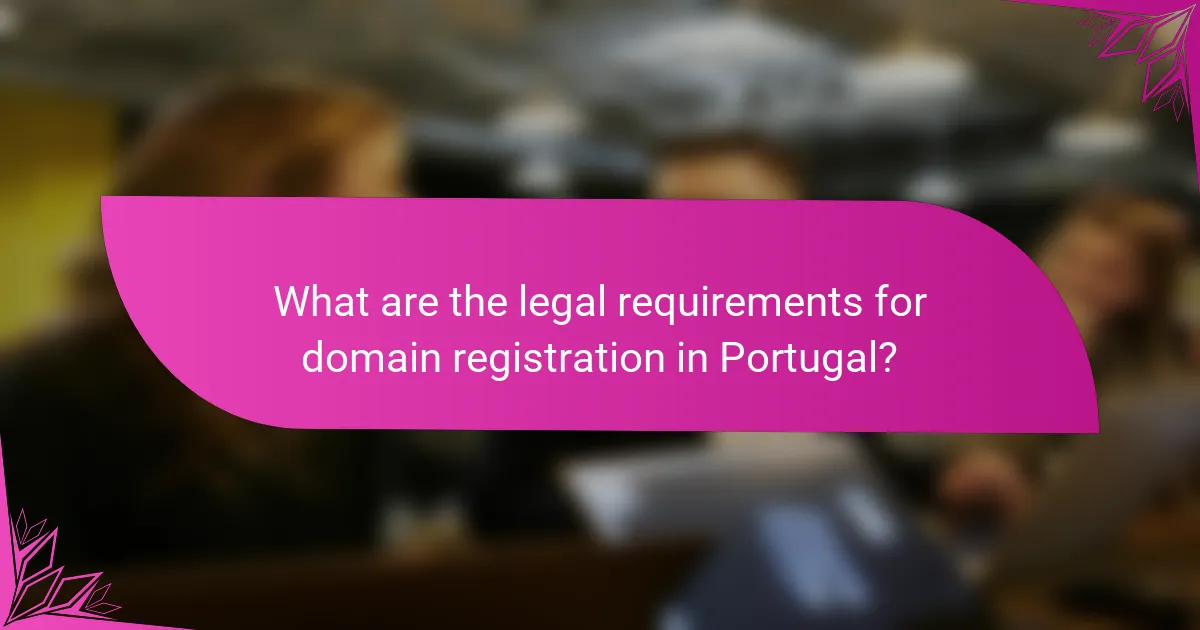
What are the legal requirements for domain registration in Portugal?
To register a domain in Portugal, you must comply with local laws, possess a Tax Identification Number (NIF), and adhere to specific policies for .pt domains. These requirements ensure that the registration process is legal and streamlined for both individuals and businesses.
Compliance with local laws
Domain registration in Portugal requires adherence to national regulations, including the need to respect intellectual property rights and consumer protection laws. Registrants must ensure that their chosen domain name does not infringe on existing trademarks or violate any local statutes.
It’s advisable to conduct a thorough search for existing trademarks before finalizing a domain name. This can help avoid legal disputes and potential loss of the domain after registration.
Possession of a NIF (Tax Identification Number)
All individuals and entities wishing to register a domain in Portugal must have a NIF, which serves as a unique identifier for tax purposes. This requirement applies to both residents and non-residents, making it essential for anyone looking to establish an online presence in the country.
Obtaining a NIF is a straightforward process, typically requiring proof of identity and residency status. Non-residents can acquire a NIF through a local representative or by visiting a tax office in Portugal.
Adherence to .pt domain policies
The .pt domain is governed by specific policies set forth by the Portuguese domain registry, DNS.PT. Registrants must comply with these policies, which include eligibility criteria based on residency or business presence in Portugal.
Additionally, domain names must be relevant to the registrant’s identity or business activities. It’s crucial to review the DNS.PT guidelines to ensure compliance and avoid registration issues.
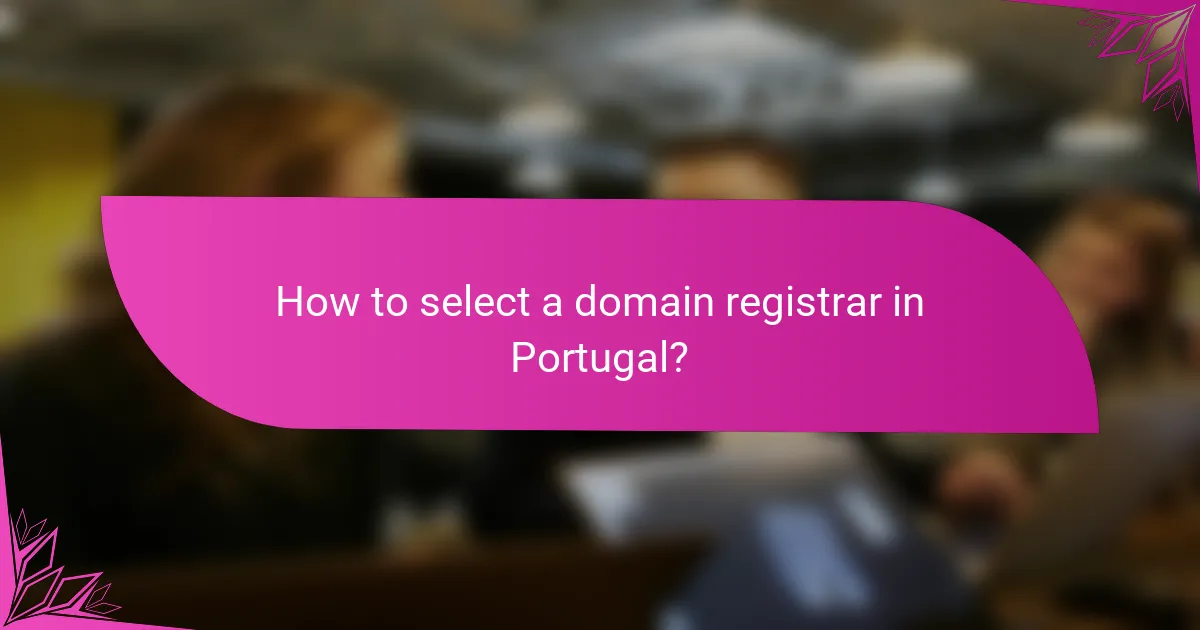
How to select a domain registrar in Portugal?
Selecting a domain registrar in Portugal involves assessing their accreditation, pricing, services, and customer support. A reliable registrar ensures compliance with local regulations and provides essential features for your domain management.
Check registrar accreditation
Ensure that the registrar is accredited by the national authority, which in Portugal is the DNS.PT. This accreditation guarantees that the registrar adheres to the necessary standards and regulations for domain registration.
Look for registrars that display their accreditation status prominently on their websites. This can help you avoid potential issues with domain ownership and transfer in the future.
Compare pricing and services
Domain registration prices in Portugal can vary significantly, typically ranging from €10 to €30 per year depending on the registrar and the domain extension. Compare the costs of different registrars to find a competitive rate.
Additionally, consider the services included in the registration fee, such as domain privacy protection, email hosting, and DNS management. Some registrars may offer bundled services that provide better value.
Evaluate customer support options
Customer support is crucial when selecting a domain registrar. Look for registrars that offer multiple support channels, such as phone, email, and live chat, to ensure you can get help when needed.
Check reviews and testimonials to gauge the quality of customer support provided. A registrar with responsive and knowledgeable support can save you time and frustration during domain management or troubleshooting issues.
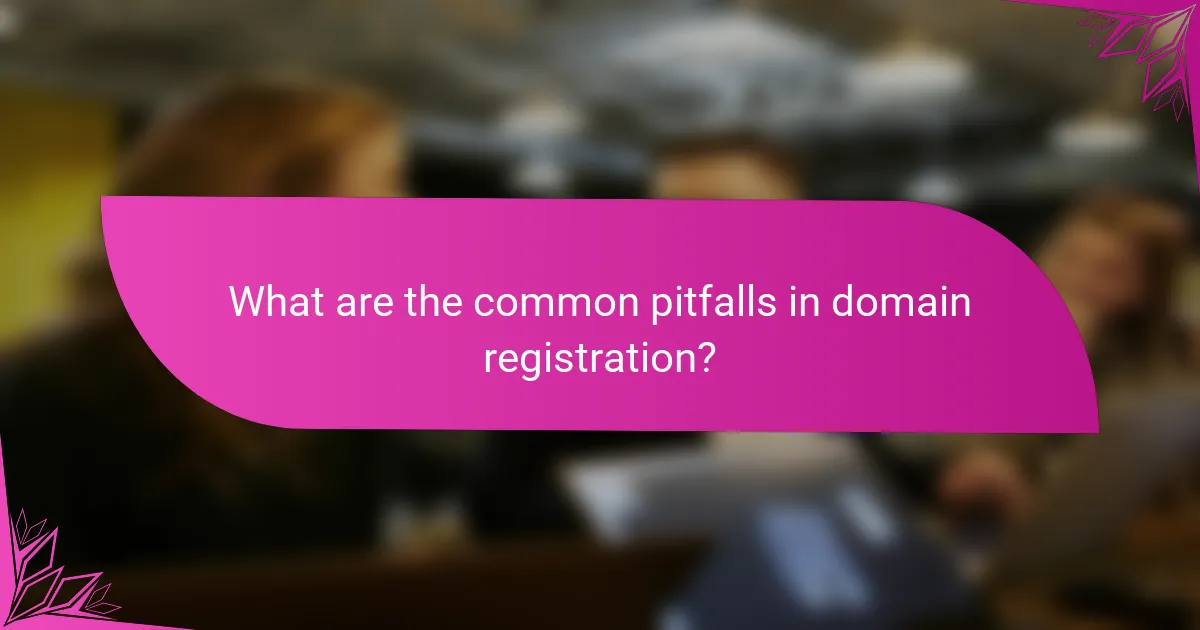
What are the common pitfalls in domain registration?
Common pitfalls in domain registration can lead to significant issues, including loss of ownership or legal complications. Understanding these pitfalls is essential for ensuring a smooth registration process and maintaining control over your domain.
Neglecting to renew domain
Failing to renew your domain can result in losing ownership, which may allow others to register it. Domains typically require annual renewal, and missing this deadline can lead to a grace period where you might still reclaim it, but after that, it could be available for anyone.
Set reminders for renewal at least a month in advance and consider enabling auto-renewal if your registrar offers it. This proactive approach can help prevent unintentional lapses in ownership.
Using prohibited terms
Using prohibited terms in your domain name can lead to registration denial or legal disputes. In Portugal, certain words related to government, public institutions, or offensive language are restricted.
Before registering, check the list of prohibited terms provided by the domain registrar or the national authority. Avoid using trademarks or names that could infringe on existing rights to prevent potential legal challenges.
Failing to protect personal information
Not protecting your personal information during domain registration can expose you to privacy risks. Registrars often require personal details, which can be publicly accessible through WHOIS databases.
Consider using domain privacy services that mask your personal information from public view. This can help safeguard your identity and reduce the risk of spam or unwanted solicitations.
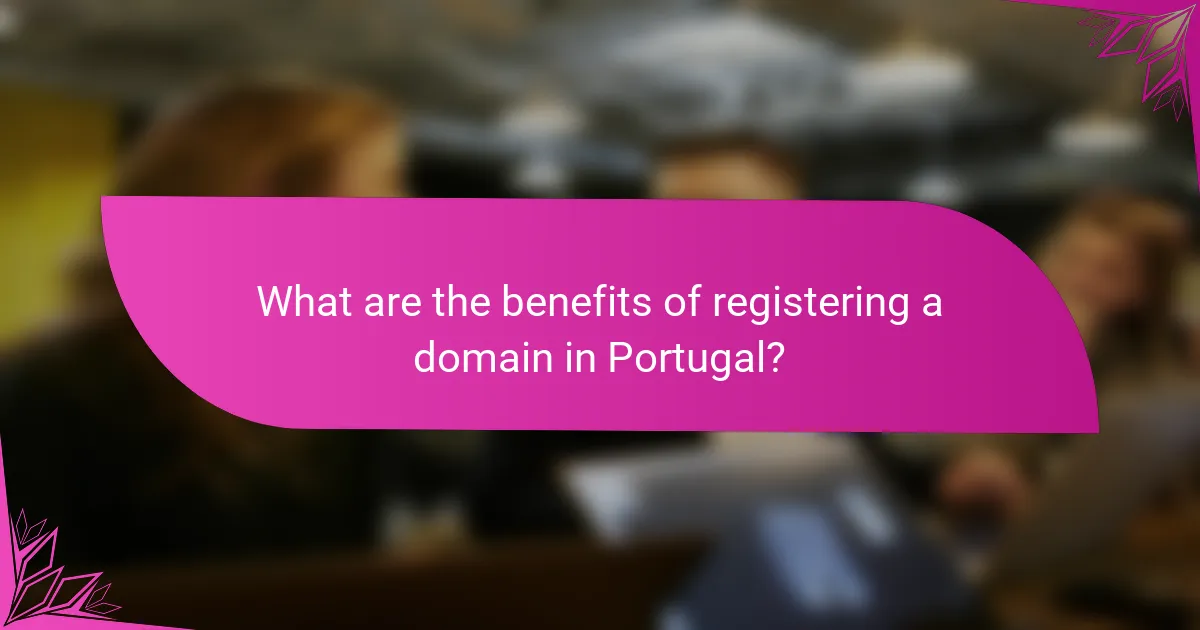
What are the benefits of registering a domain in Portugal?
Registering a domain in Portugal offers several advantages, including access to local markets, improved search engine optimization (SEO), and enhanced brand credibility. These benefits can significantly impact your business’s online presence and customer engagement in the Portuguese-speaking community.
Access to local market
Having a domain registered in Portugal allows businesses to tap directly into the local market. This local presence can help attract customers who prefer to engage with businesses that are based in their country.
Additionally, a .pt domain signals to consumers that your business is rooted in Portugal, which can foster trust and encourage local patronage. This is particularly important for small to medium enterprises looking to establish a foothold in their communities.
Improved SEO for Portuguese audience
A domain registered in Portugal can enhance your website’s search engine ranking for local queries. Search engines often prioritize local domains when users search for services or products within the country.
By optimizing your website with local keywords and content relevant to the Portuguese audience, you can improve visibility and attract more organic traffic. This is crucial for businesses aiming to compete effectively in the local digital landscape.
Enhanced brand credibility
Registering a domain in Portugal can significantly boost your brand’s credibility. A local domain extension, such as .pt, conveys professionalism and commitment to the local market.
Consumers are more likely to trust businesses that demonstrate a local presence, which can lead to increased customer loyalty and repeat business. Ensuring your website reflects local culture and values can further strengthen this credibility.

What are the alternatives to .pt domains?
Alternatives to .pt domains include various country code top-level domains (ccTLDs) and generic top-level domains (gTLDs). Businesses and individuals in Portugal can consider options like .com, .net, .org, or even newer gTLDs that may better reflect their brand or purpose.
.com Domains
The .com domain is one of the most recognized gTLDs globally and is often preferred for commercial entities. It is suitable for businesses looking to establish a strong online presence beyond Portugal. However, competition for .com domains can be intense, and many desirable names may already be taken.
.net Domains
.net domains are typically associated with network services and infrastructure but are widely used by various types of organizations. They can serve as a good alternative for businesses in Portugal that want a recognizable domain without the limitations of .pt. Availability may vary, so it’s advisable to check for desired names early.
.org Domains
.org domains are primarily intended for non-profit organizations, but they are also used by various groups and individuals. This option can be appealing for NGOs or community-focused initiatives in Portugal. Keep in mind that while .org is well-respected, it may not convey a commercial intent as effectively as .com or .net.
New gTLDs
New gTLDs, such as .tech, .shop, or .design, offer specific branding opportunities and can be tailored to niche markets. These domains can help businesses in Portugal stand out in their respective industries. However, it’s essential to ensure that the chosen gTLD aligns with the brand’s identity and target audience.
Country-Specific Alternatives
In addition to .pt, other country-specific domains like .es (Spain) or .fr (France) may be relevant for businesses operating in those markets. Using a ccTLD can enhance local credibility but may limit the perceived reach to a broader audience. Evaluate the target market before selecting a country-specific domain.
